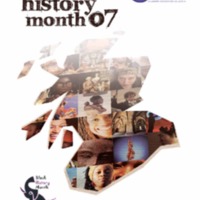
Black History Month 07
Glasgow Anti Racist Alliance (GARA) organised a programme of events for Black History Month in October 2007 with a particular focus on the bicentenary and engaging people in the importance of Black history. GARA were supported by Glasgow City Council Education Services and Culture and Sport Glasgow. Events included talks at the Hunterian Museum, interactive exhibits at the Glasgow Science Centre and film showings, capoeira and African drumming workshops at the Glasgow Film Theatre. Sugar & Spice Sunday on 14 October marked the bicentenary with a festival of commemoration and celebration through films and events. GARA also hosted Black History Tours around Glasgow to explore the city's hidden slavery history.

Events to mark the bicentenary in Exeter
On Sunday 25 March 2007, a ceremony was held on Cathedral Green in Exeter to mark the bicentenary. Organised by Exeter City Council, the ceremony was attended by members of the public and individuals representing local organisations. Historian Lucy MacKeith examined the links between Devon, the transatlantic slave trade and its abolition. Extracts were read from the Narrative of Olaudah Equiano, and names read aloud of some of the Africans who came to Devon because of the county's connection to the slave trade.
The play 'Albert and the Story of Equiano' was performed at the Royal Albert Memorial Museum in October 2007. It told the story of Olaudah Equiano, a leading African figure in the British abolition movement in the 18th century.
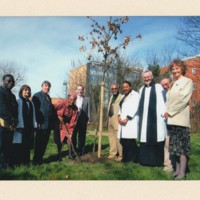
Events led by Leyton and Leytonstone Historical Society
The Leyton and Leytonstone Historical Society led a number of commemorative events to mark the bicentenary. In March 2007 an oak tree was planted in the churchyard of St John’s Church Leytonstone. At the ceremony there were a number of speeches, after which community nurse and local campaigner Mrs Zena Edmund-Charles was invited to plant the commemorative tree. There was also an art exhibition at St John's featuring artefacts and mementos of the period. A commemorative ‘Freedom Walk’ was led by local historian Peter Ashan, following a route around Leyton, Leytonstone and Walthamstow. The exhibition was shown again during Black History Month, alongside a video story of Olaudah Equiano.
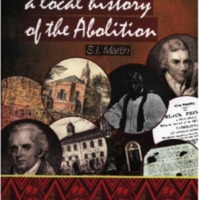
Lambeth and the Abolition
The Lambeth and the Abolition programme included debates, historic trails, a video conferencing discussion between people in Brixton, Ghana and Jamaica, Caribbean family history classes, creative writing workshops, and a dedicated series of events within Black History Month. ‘The Runaways’, an original drama about a runaway slave boy and a kitchen maid in London in 1700, was performed in Lambeth primary schools, accompanied by a workshop. The project researched the local historical links to abolition, and famously the activities of the Clapham Sect (William Wilberforce and his associates) who attended Holy Trinity Church in Clapham. A booklet by historian S. I. Martin sets the history of abolition in the larger context, through his study of the African Academy at Clapham, and his mapping of some of the links between Lambeth, Jamaica and West Africa at the beginning of the 19th century.
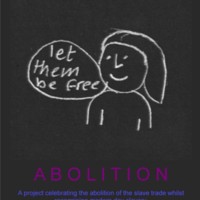
Abolition
Abolition was an art project devised and led by artist Jack Brown, in collaboration with Tidemill Primary School in Deptford. It took place during Black History Month 2007, and aimed to commemorate the abolition of the transatlantic slave trade while recognising the existence of modern day slavery. Every child in the school made a 'step', an artwork representing their perspective on the writing, discussion and petitioning that drove abolition. The children visited the Laban Building at Trinity Laban Conservatoire of Music and Dance and laid their step on the studio theatre floor. Taken together, the steps were conceived as a 'stairway to change'.
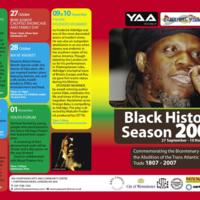
Black History Season 2007: Commemorating the Bicentenary of the Abolition of the Trans Atlantic Slave Trade 1807-2007
A programme of events and activities for Black History Month 2007 from Yaa Asantewaa Arts and Community Centre had a particular focus on the bicentenary. The programme included theatre, youth projects and family days. Calypso Fuh So performed special Calypsos to mark the bicentenary, and YAA/Carnival Village organised a commemorative walk to remember ancestors who died in slavery, and the Black presence in Britain. Ritual Theatre Arts created a film celebrating thirty years of African dance in Britain and International Word Power featured performances of poetry, storytelling and song.
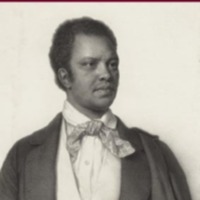
Events to mark the bicentenary in the City of Westminster
In 2007 Westminster City Council supported a programme of events in the libraries, galleries and archives of the area, including films, walks and exhibitions, designed to provide opportunities to learn about the culture of Westminster's communities. Highlights included guided heritage walks with historian S. I. Martin, exhibitions of images from the Royal Geographical Society in Paddington Library, Maida Vale Library and Westminster Reference Library, and film screenings (in partnership with 100 Black Men of London). A partnership between the City of Westminster Archives Centre, Tate Britain, Parliamentary Archives, National Gallery and National Portrait Gallery produced a heritage trail 'On the Road to Abolition: Ending the British Slave Trade', which takes in key sites, events and individuals in Westminster relating to the slave trade, between Trafalgar Square and Pimlico. In celebration of Black History Month, Westminster City Council produced a booklet, 'Black History in Westminster', detailing some of the borough's influential Black residents.
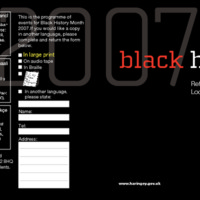
Haringey Council Black History Month
In consultation with the Black community in Haringey, the programme for Black History Month 2007 included many events to commemorate the bicentenary of the Abolition Act. Several took place at the Marcus Garvey Library in Tottenham, including poetry writing workshops, African drumming and dance workshops, and an exhibition and presentations led by Anti-Slavery International. There were several events to mark the bicentenary, including by Bedale House Supported Housing Scheme (featuring tenants' video diaries, a short film, poetry and guest speakers) and by Efiba Arts, supported by The Bridge New Deal for Communities. Haringey Council ran a poetry competition on the theme of slavery for young people aged 13-15. The winning entries were published in a pamphlet distributed to schools and libraries in the borough. Historian S. I. Martin led a guided tour of Haringey's places relating to the abolition of the slave trade. There was also a series of seminars by Robin Walker addressing 'Transatlantic Enslavement: What really happened?'.
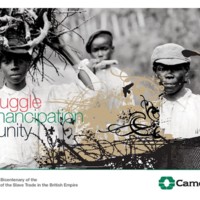
Struggle, Emancipation and Unity
The year-long programme of commemorative events from Camden Council was put together in consultation with the 1807-2007 Taskforce of local African and Caribbean community leaders. The key to these events was remembering slavery through the resistance of Africans, their celebration in their liberation and their unity in tackling present-day inequalities. Camden’s 18th and 19th Century Slavery Trail was created around the area. In eight stops, it explored the lives of men and women connected to the slave trade who lived and worked in the London Borough of Camden. The Resistance Film Season, in partnership with the British Museum, explored the legacy of the slave trade through a mixture of contemporary and classic films. Other events also included local exhibitions, poetry readings, debates and talks.
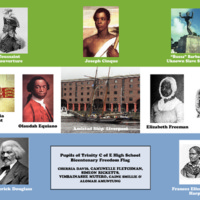
Bicentenary Freedom Flag
The Bicentenary Freedom Flag was displayed alongside an exhibition about Wartime Black History at Manchester Town Hall. The project was a collaboration between staff from Manchester City Council Corporate Services Black Staff Group and pupils of Trinity Church of England School in Manchester. The flag recognised the work, struggles and sacrifices of those who brought the slave trade to an end, and featured images of prominent individuals on the background of the Sierra Leone flag. Those featured on the flag included Toussaint L'Ouverture (General of the Haitian Uprising), the abolitionist Olaudah Equiano, the anti-slavery orator Frederick Douglass, the statue in Barbados of 'Bussa', the unknown slave, guide of the Underground Railroad Harriet Tubman, and Joseph Cinque, leader of the Amistad slave ship revolt. The accompanying exhibition included pupils' articles and creative writing. It also examined the history and role of the West India Regiments, British colonial infantry regiments largely recruited amongst freed slaves from North America and slaves purchased in the West Indies.
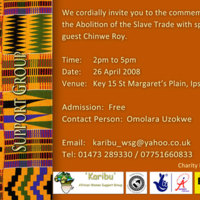
Karibu African Women's Support Group
Karibu provides information, advice and help service to African women and their families in Ipswich and Suffolk. Karibu women joined the celebrations marking African History Month in Suffolk in 2007. The event 'Reaching Out Promoting Cultural Values' was designed to reach out to other local communities. It featured a keynote speaker address, workshops on health and beauty, and parades of foods and culture from Africa. 'Our Children Our Pride' was an activity day featuring carnival arts and crafts, drumming sessions, dance, and stories from Africa.
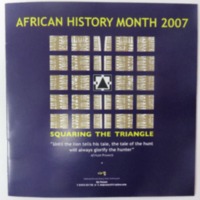
African History Month 2007: Squaring the Triangle
Squaring the Triangle was the theme of African History Month 2007 in Suffolk. The programme was co-ordinated by the Nia Project (a cultural, arts and heritage project) and explored the history and legacy of slavery through film, literature, exhibition, music and debate. The theme of Squaring the Triangle was underpinned by the African proverb, ‘Until the Lion tells his tale the tale of the hunt will always glorify the hunter’. Highlights included the Nia Memorial Lecture, given by the producer-director Pam Solomon-Fraser. Nubian Films short season looked at the current legacy of slavery and the Diaspora of African peoples. Talks, workshops and debates covered issues such as reparations, retribution, resistance, and educational guidelines for parents on how to discuss the African slave trade with children. Special recognition was given in the programme to Ghana’s 50th anniversary as an independent state. There were heritage walks around Ipswich to uncover some of the cultural connections with Africa, the Caribbean and Suffolk. A Youth Day Conference hosted by the Zimbabwe Youth brought together young people from the community to use music and poetry to explore their ideas on the legacy of the slave trade. Historian Maureen James and representatives from Suffolk County Council led pupils from local schools in researching the anti-slavery movements, with particular reference to the Clarkson family.
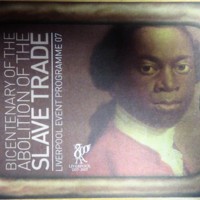
Liverpool Event Programme 07
Liverpool hosted a city-wide programme of activities and projects to commemorate the bicentenary, as part of events to mark the city's 800th birthday. The events aimed to celebrate the African Diaspora and support works by artists of African descent. They included: LEAP, an annual contemporary dance festival featuring African dance companies; a performance of Mighty Diamonds - Reggae Legends at the Philharmonic Hall; the Roscoe Lectures; the Brouhaha International Carnival, celebrating resistance, rebellion and abolition; the Africa Oyé Music Festival at Sefton Park; the Bound exhibition at Open Eye Gallery, showing works representing personal perspectives on the physical and psychological impact of slavery on humanity; and many other lectures and debates. There was also a slavery trail around the city.